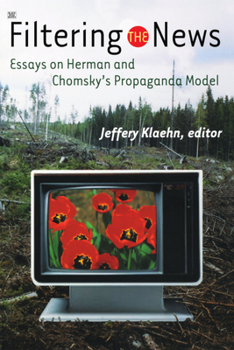Filtering The News
Select Format
Select Condition 
Book Overview
Edward S. Herman and Noam Chomsky's 'propaganda model' argues that there are five classes of 'filters' in society which determine what is news: in other words, what gets printed in newspapers or broadcast by radio and television. Whether a news item is going to be used by the media, or not, is going to depend on whether it can pass through these filters.
Filtering the News begins with a critical review and assessment of the propaganda model, then applies Herman and Chomsky's model to a range of ongoing news events. In the final chapters, several common criticisms of the model are reflected upon and scrutinized.
Contributors include: Robert Babe, Valerie Scatamburlo-D'Annibale, Peter Eglin, Robert Everton, RobertJensen, Jeffrey Klaehn, and James Winter.
Jeffery Klaehn has been publishing in a wide range of scholarly journals. He is ediotor of the forthcoming Bound by Power: Intended Consequences (Black Rose Books) and of Comic Books and Comic Book Culture: Studies in Pop Culture.






